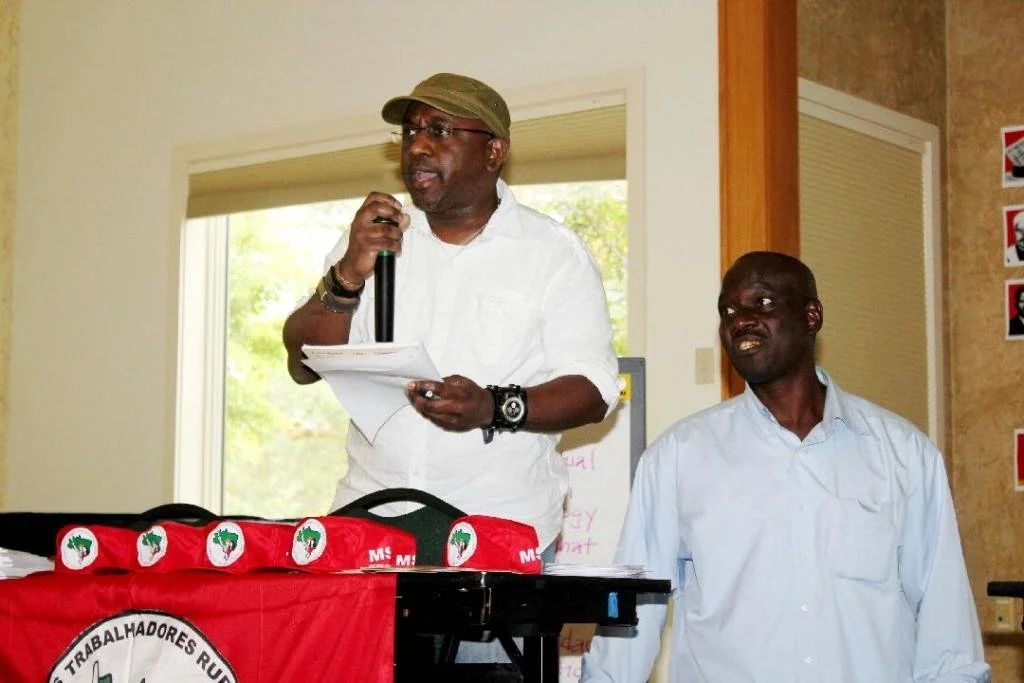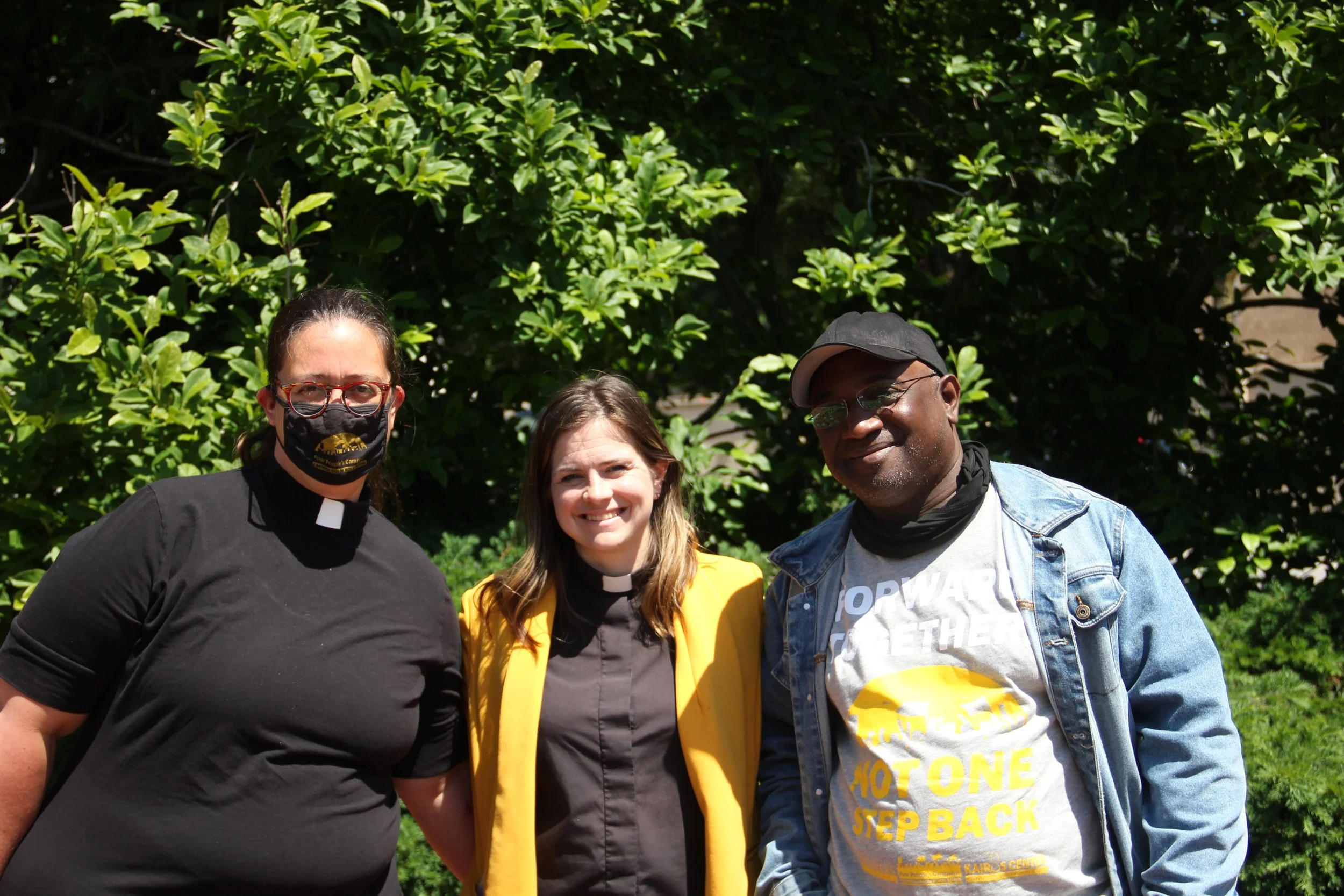“A calling”—Why Kevin Pierre marches
Kevin Pierre, Tri-chair of the New Jersey Poor People’s Campaign (NJPPC), giving a speech at a rally. (Photo courtesy of Kevin Pierre)
Some are called to sing, others to preach, but Kevin Pierre’s calling is standing up for the people he calls “the least among us.” Pierre, 47, is Tri-Chair of the New Jersey Poor People’s Campaign, or NJPPC, an organization he joined in the fall of 2018 because he saw too many people who did not reach their full potential because of their economic situations.
He says his concern for the underprivileged started in childhood, but his passion for organizing began in his teen years with a college economics lesson about sweatshops. Struggling through the lecture, he felt compelled to interrupt his professor to voice his objection to the practice of employing people for low wages in untenable working conditions. In response, the teacher called him a “bleeding heart liberal hippie.” All Pierre knew was that he couldn’t sleep at night knowing “some kid on the other side of the border would suffer so [he] could live in luxury.”
Pierre has been speaking up about injustices ever since.
A worker for New Sanctuary Coalition and UndocuBlack, Pierre was exposed to PPC while attending a summit at the Kairos Center in Michigan in the summer of 2018. There he met others in the same line of work, including Reverend Dr. Liz Theoharis, Co-Chair of the PPC. The interactions made him realize activism was much bigger than he thought and there was more work to be done.
(From left to right) Rev. Liz Theoharis, Rev. Robin Tanner and Kevin Pierre, New Jersey Chair of the PPC, at the PPC rally in New Jersey on June 4, 2022. (Josie Gonsalves for Public Square Amplified)
“It’s hard to say the word ‘I fell in love with it’ because it’s really a work of love,” he said. “I don’t love having to do it, I really wish I never had to do it, but you’re seeing so many people suffer [that] if I have the time to devote or means to devote, [I’ll] try to do as much as I can.”
According to its website, PPC seeks to continue the “unfinished work” of Dr. Martin Luther King Jr., who sought to build a “broad fusion movement that could unite poor and impacted communities around the country.” At the time Pierre became aware of the movement, it wasn’t flourishing in New Jersey as in other cities like New York and Philadelphia, he said. Determined to change that, along with other tri-chairs, they launched the NJPPC in 2019, and it grew.
In his role, Pierre helps organize marches and speaks at events. However, he understands there’s more to the job—the movement takes action. It’s personal to him. Growing up in Williamsburg, Brooklyn, in the early 80s, Pierre witnessed a lot of economic depression. He would often look out his window to see others living in abandoned buildings or burning furniture to keep warm in the winter. Then, when he lost his Portside Cafe business at Pier 79, he realized there weren’t safety nets in place for people like him. That’s why he wants others to know there’s a need to “check their balances,” referring to those in authority. He noted that “the people at the bottom pay taxes for the infrastructure,” while those in big corporations thrive off not paying it.
“The divergence of economic equity and economic power is splitting further and further between the rich and the poor, and it's something that I think is bearing activism in so many different ways,” he said. “And one of the things we do with the Poor People's Campaign is that we embody the spirit of the monetary umbrella.”
It’s a growing movement. He believes PPC has now become more popular because so many people are suffering. During the march this year in Washington D.C on June 18, the Mass Poor People and Low Wages workers, over 30,000 people joined PPC members to demand attention to urgent issues like those affecting their livelihood. Pierre traveled with others from New Jersey and was surprised by the turnout. When he looked around and saw different organizations with different signs, he took that as a sign of success—he called it beautiful. He says it shows how much of an interest the movement is to others, not only because of how global the struggle is but because “everyone needs to be stewards of their fellow man.”
To him, getting involved in organizations like PPC is effective for change because everyone has a seat at the table. It’s a “we” problem since it affects everyone around the country, and in their conversations, no man is left out. He likens his involvement to watering a plant while someone else acts as the fertilizer, and together, they build. It’s why he loves campaigning and bringing people together, because “it umbrellas so many organizations and their plights,” he said. He added that it’s their opportunity to galvanize an idea around an issue that’s affecting everyone around the country. To anyone against that, he said there leaves no room to gain improvement.
Kevin Pierre, Tri-chair of the New Jersey Poor People’s Campaign (NJPPC), in front of Senator Cory Booker’s office, giving a speech on July 26, 2021. (Photo courtesy of NJPPC Live video)
In fact, that’s a roadblock he’s encountered when it comes to organizing—people with different mentalities. He said there are movements galvanized by finance more than they are by the progress of the poor; then there are others more concerned about other organizations taking away their membership instead of looking at it as a shared effort. Pierre emphasized how much it needs to start and continue from a labor of love. It was a lesson he took from his mentor, Albert Pelhan, in learning to be a better activist—how to show up for people.
“[He told me] you got to keep doing it, you got to keep showing up, and you got to let people know that you’re there for them,” he said. “As you show your face up more and more, people are going to realize your attention [and] when people start seeing your attention is good … you start to build your movement.”
Pierre’s learning experience is why he stresses the importance of elders in the lives of the next generation of leaders. He said he’d seen youth organizations that just include young people, with little or no involvement from the middle-aged and elderly matter. He would like the youth to keep in mind that it is those same elders who placed their “bodies out in the open” to get many issues resolved.
“If you keep trying to redefine the struggle and lose the message, you’ll continue to fall into [a] different direction,” he said. “We’re in the same boat together, and at some point, the youth is going to be older, and nobody wants to be looked at as devalued at that point.”
“The elderly are valuable when it comes to anything,” he added.



